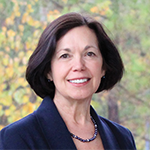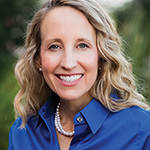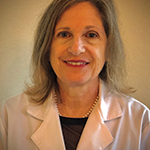Leigh Callahan, PhD, Now President Elect of United States Bone & Joint Initiative
 After 20 years of involvement with the U.S. Bone and Joint Initiative (USBJI), Leigh F. Callahan, PhD, Mary Link Briggs Distinguished Professor of Medicine, associate director, Thurston Arthritis Research Center, and director, Osteoarthritis Action Alliance at the University of North Carolina at Chapel Hill, became the organization’s president elect in June 2020 and will assume the reins as president in June 2021. We spoke with Dr. Callahan recently about her new responsibilities and the evolving focus of the organization as the pandemic continues.
After 20 years of involvement with the U.S. Bone and Joint Initiative (USBJI), Leigh F. Callahan, PhD, Mary Link Briggs Distinguished Professor of Medicine, associate director, Thurston Arthritis Research Center, and director, Osteoarthritis Action Alliance at the University of North Carolina at Chapel Hill, became the organization’s president elect in June 2020 and will assume the reins as president in June 2021. We spoke with Dr. Callahan recently about her new responsibilities and the evolving focus of the organization as the pandemic continues.
Dr. Callahan accepted the position of president elect for two reasons. The first was her long-time commitment and history with USBJI, having served on the USBJI’s Burden of Illness Task Force and the World Health Organization’s Burden of Musculoskeletal Disease Working Group. She has also represented the Arthritis Foundation and the Rheumatology Research Foundation on the USBJI Board of Directors at various points in the past.
The second compelling reason for accepting the new role is that she enjoys working with alliances, which has been a strong suit throughout her career. For example, as director of the Osteoarthritis Action Alliance, she’s seen organizational partnerships grow to more than 130 organizations, including those with universities, faith-based entities, parks and recreation departments, YMCAs, and professional societies, such as the ACR.
Working with alliances offers “a unique opportunity to communicate with a more comprehensive voice and to have a broader impact than if you’re speaking with just one hat on,” she says.
Her years with the Division of Rheumatology, Allergy and Immunology at UNC’s Thurston Arthritis Research Center have taught her that it’s possible to “move the needle forward” in terms of musculoskeletal diseases.
Moving the needle forward has become more complex due to the coronavirus pandemic, she acknowledges, but emphasizes the USBJI’s recognized ability to be nimble and fluid offers many opportunities for growth.
The Young Investigators Initiative, like other domains of the USBJI, has gone virtual, and Dr. Callahan reports the 2020 spring and fall virtual Young Investigators meetings went well. She is also working to expand the Burden of Musculoskeletal Diseases in the United States (BMUS), which she labels one of “the crown jewels” of the USBJI, now in its fourth edition.
USBJI is also the U.S. national action network of the Global Alliance for Musculoskeletal Health (GMUSC), an international collaborative movement sanctioned by the United Nations/World Health Organization.
Dr. Callahan is dedicated to expanding national work and efforts to remain connected to global endeavors. Honored to be in the position of president elect, Dr. Callahan is hopeful and enthusiastic regarding the future expansion of the initiative.
Maria Dall’Era, MD, Named Chief of UCSF Division of Rheumatology
 Maria Dall’Era, MD, the Jean S. Engleman Distinguished Professor in Rheumatology and director of the University of California, San Francisco (UCSF) Lupus Program and the Rheumatology Clinical Research Center, signed the offer letter to become chief of the division one week before Gov. Gavin Newsom issued the stay-at-home order due to the coronavirus pandemic.
Maria Dall’Era, MD, the Jean S. Engleman Distinguished Professor in Rheumatology and director of the University of California, San Francisco (UCSF) Lupus Program and the Rheumatology Clinical Research Center, signed the offer letter to become chief of the division one week before Gov. Gavin Newsom issued the stay-at-home order due to the coronavirus pandemic.
“It has been a very humbling and interesting time,” she says of the timing for her transition to the new post. Her immediate task was to meet with the rheumatology faculty members to understand their individual needs within the division, an activity that took place via remote video conferencing. Dr. Dall’Era says she felt fortunate, because “I have a fantastic faculty and staff, and having grown up in the division, I already had personal relationships with many of them.”
Not only is Dr. Dall’Era a Bay Area native, she has spent her entire medical career at UCSF. Following her undergraduate degree in immunology from UC Berkeley, where she worked in the laboratory of Nobel laureate James P. Allison, PhD, she obtained her medical degree from UCSF. She did her residency, became chief resident and did her rheumatology fellowship there as well, and joined the faculty in 2004.
The choice to enter medical school was driven by her interest in research, coupled with the desire to apply discoveries to her care of patients. She recalls that while she was chief resident, she was drawn to the fact that during weekly conferences and grand rounds, the rheumatology patients were often the most enigmatic. “They often presented diagnostic dilemmas, with pleomorphic systemic manifestations,” she says.
Further investigation convinced her that rheumatology was “the perfect intersection between my interest in solving puzzles, taking care of patients and my interest in immunology.”
Her attraction to specializing in lupus was an outgrowth of work with her mentor, David Wofsy, MD, a prominent laboratory researcher who had transitioned his career to clinical trials in lupus.
Dr. Dall’Era’s primary research has focused on developing novel therapies and conducting clinical trials in lupus. She is also the principal investigator of a population-based SLE longitudinal cohort funded by the Centers for Disease Control and Prevention and is co-chair of the steering committee for the Lupus Clinical Investigators Network.
Her aim as chief of the division is to do everything she can to help her faculty, staff and trainees succeed, and keep UCSF rheumatology moving forward with new initiatives while continuing to address the ongoing challenges posed by the pandemic. At the same time, she says, she has also begun to implement long-standing changes that support her vision for the division.
“When we finally emerge from this pandemic, it will be important for our faculty, staff and trainees to know that we are making progress and that the future of our division is very bright indeed.”
Joanne Valeriano-Marcet, MD, Receives ACGME Teaching Award
 At the University of South Florida College of Medicine, Joanne Valeriano-Marcet, MD, teaches a broad spectrum of medical students. She is program director for the Division of Rheumatology, directs the Doctoring 2 Curriculum, a course for all second-year medical students that focuses on physical diagnosis, and mentors her own rheumatology fellows.
At the University of South Florida College of Medicine, Joanne Valeriano-Marcet, MD, teaches a broad spectrum of medical students. She is program director for the Division of Rheumatology, directs the Doctoring 2 Curriculum, a course for all second-year medical students that focuses on physical diagnosis, and mentors her own rheumatology fellows.
Dr. Valeriano-Marcet has also participated in several curriculum development activities. She helped review the ACR Rheumatology Core Curriculum, sat on an Accreditation Council for Graduate Medical Education (ACGME) committee to develop rheumatology-specific milestones and has written questions for the American Board of Internal Medicine’s rheumatology certification exam.
She’s now the recipient of the ACGME Courage to Teach Award, given each fall to exemplar graduate medical professors.
Dr. Valeriano-Marcet’s teaching activities have also included developing and teaching curricula for physical therapy and physician assistant students. So it’s no wonder that she received the Outstanding Teacher Award at her institution in 2011 and that the School of Physical Therapy gave her an Interprofessionalism Award in 2010.
“I have the best of all worlds,” she says, because she teaches the whole range of next-generation clinicians. Regarding her duties as program director for the rheumatology fellowship program, Dr. Valeriano-Marcet remarks, “I can’t talk enough about the support I get from the ACR and my colleagues around the nation.”
Being involved with the ACR subcommittees has helped enormously in her work, she says. “I can’t encourage program directors enough to become involved, and to use these [ACR] resources. It helps keep us ahead of the curve.”
Of the range of her teaching activities at the University of South Florida, she notes that the Doctoring course aligns perfectly with what rheumatologists do: “We have to be very skilled at history taking and physical diagnosis. It’s exciting to be in academics.”
Gretchen Henkel is a health and medical journalist based in California.
